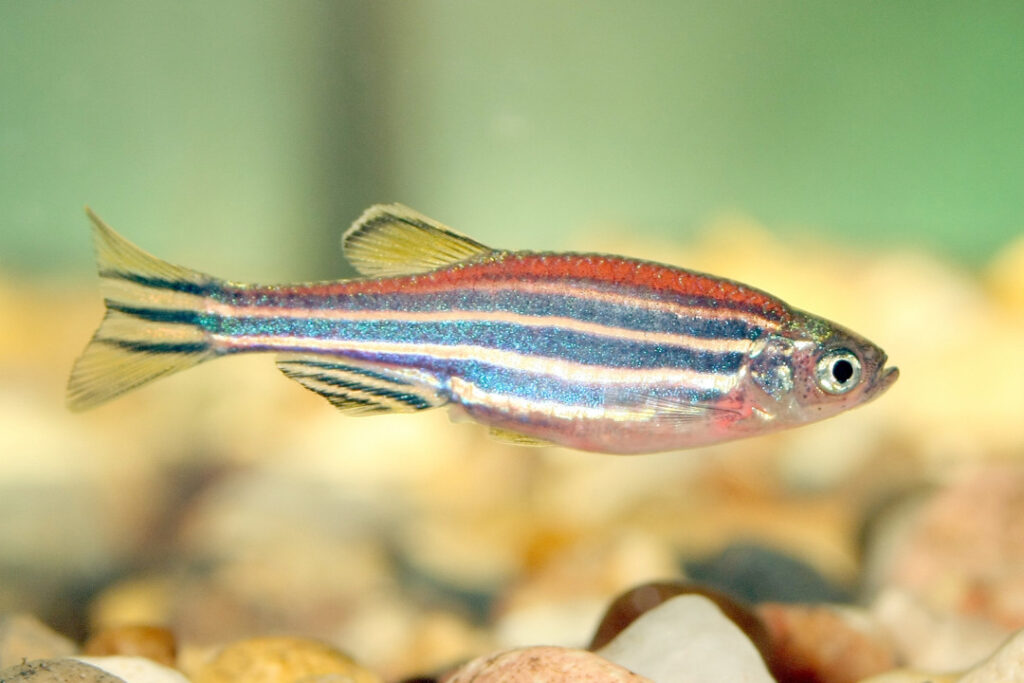
The first medication to prevent hearing loss caused by commonly used antibiotics, has been developed by biotechnology company Oricula Therapeutics.
This ground-breaking research will be presented at the Hearing Therapeutics Summit, organised by RNID with the UCL Ear Institute and UCLH NIHR Biomedical Research Centre.
Preventing hearing loss
1 in 5 adults in the UK have hearing loss, yet there are currently no treatments available to restore hearing or prevent it from being lost.
As common as hearing loss is, one company’s work involves a slightly unusual element: the zebrafish.
Oricula Therapeutics has developed the first new medication to prevent hearing loss caused by a specific class of antibiotics, and will present their work at the Hearing Therapeutics Summit, organised by RNID with the UCL Ear Institute and UCLH NIHR Biomedical Research Centre.
This new medication, ORC-13661, offers the exciting potential of preventing hearing loss in patients being treated with aminoglycoside antibiotics. Aminoglycosides are a well-known and effective class of antibiotics used to treat serious or life-threatening bacterial infections such as tuberculosis (TB), respiratory infections, sepsis and lung infections in people with cystic fibrosis.
Although an important class of antibiotic, 10-20% of people treated with aminoglycosides develop permanent hearing loss or balance problems. This can be as high as 80% in people who require repeat courses or long-term exposure to aminoglycosides over their lifetime.
Why zebrafish?
Zebrafish are found in freshwater habitats in South Asia and take their name from the five uniform horizontal stripes on the side of their body, which are blue-black in colour.
They have helped scientists understand a multitude of health conditions, including Alzheimer’s disease, congenital heart disease, polycystic kidney disease and some cancers.i The unassuming fish, which measure between 2.5 cm to 4 cm longii, has even made it into spaceiii for research on the International Space Station.
Zebrafish share 70 per cent of their genes with humansiv, making them a good choice for scientific research, but it is their differences as well as their similarities which make them so perfect for scientists studying the hair cells of the inner ear.
The inner ear in humans and other mammals is extremely difficult to access, as it is surrounded by a bony structure called the otic capsule, the hardest and densest bone in the bodyv. Like human inner ear auditory hair cells, zebrafish lateral line hair cells detect changes in pressure of the liquid medium that surrounds them. Unlike humans, however, these hair cells are conveniently located on the outside of the fish, making them directly observable and accessible.
Working at the University of Washington and the Fred Hutchinson Cancer Centre, founders at Oricula successfully discovered how to protect the hair cells in zebrafish lateral line from the toxic effects of aminoglycosides, which can cause the death of hair cells in the inner ear, resulting in hearing loss.
The company has now built on their research to develop ORC-13661 as an oral medication to protect the hearing of people who need to be exposed to long courses or high doses of aminoglycosides. ORC-13661 successfully completed Phase 1 clinical trials and was shown to be safe and well tolerated in people. Oricula is now preparing to start the second phase “proof of concept” clinical trial to further define the drug’s effectiveness.
Professor Edwin Rubel, Chief Scientific Officer and co-founder of Oricula Therapeutics said:
“This is a huge step that we’ve envisioned for the past ten years. If this trial is successful, it could mean that this important class of antibiotics can safely be used much more broadly and ORC-13661 will become the standard of care to protect people against the side effects of hearing loss whenever they are used. We thank the National Institutes of Health and RNID for supporting the development of new drugs to prevent hearing loss.”
Dr Ralph Holme, Director of Research and Insight at RNID, said:
“RNID is hugely excited about Oricula’s work to develop this new drug to prevent hearing loss caused by commonly used antibiotics. If approved, this drug could go on to save the hearing of thousands of people who need to take aminoglycosides to treat serious or life-threatening bacterial infections.”
“We are committed to a future where effective hearing loss or tinnitus treatments are available for those who need and want them, and we eagerly await the outcome of the Phase 2 trial for ORC-13661 which could make a life changing difference to so many.”
The Hearing Therapeutics Summit is organised by RNID with the UCL Ear Institute and National Institute of Health Research.
It will take place on Saturday, 2 September with experts, researchers and industry coming together to discuss bringing new treatments to patients, challenges in hearing therapeutics development and bridging the gap between academia and industry.
[i] Zebrafish 10 facts :: Understanding Animal Research
[ii] Why use the zebrafish in research? – YourGenome
[iii] ‘Zebrafish Flex Their Muscles For Research Aboard the International Space Station’
[iv] Why use the zebrafish in research? – YourGenome
[v] Optimal Ancient DNA Yields from the Inner Ear Part of the Human Petrous Bone – PMC (nih.gov)